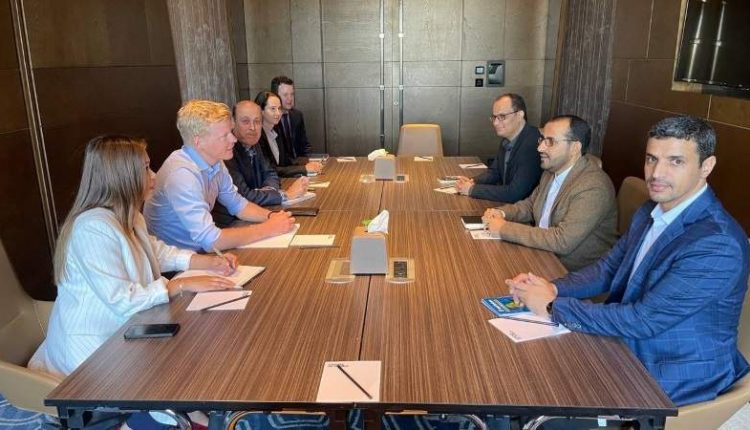Abdulsalam Engages in Talks with UN Envoy: Progress and Obstacles on Peace Roadmap Discussed
Mohammed Abdulsalam, head of the National Delegation, held talks with the UN Special Envoy for Yemen, Hans Grundberg.
Abdulsalam clarified in a tweet on X on Friday that the discussions encompassed humanitarian, political, and military dimensions, focusing on progress made within the roadmap and overcoming pivotal obstacles.
He noted that the discussion focused on overcoming obstacles to ensure an end to the aggression, lifting the blockade, paying salaries, releasing prisoners, withdrawing foreign forces from Yemen, and initiating reconstruction efforts.
Abdulsalam conveyed gratitude for Oman’s support in the peace process, acknowledging the significance of the dialogue rounds in Muscat, Sana’a, and Riyadh.
Saudi Arabia, backed by the US and its other regional allies, launched a devastating war on Yemen in March 2015. The kingdom also imposed a blockade on the country in the same year.
The nine years of war have killed hundreds of thousands of people and destroyed much of the country’s infrastructure. The US and other Western countries have been providing Saudi Arabia and its allies with arms and logistics support.
Not only has the Saudi-led coalition failed to meet its objectives by launching the brutal war, but also killed hundreds of thousands of Yemenis and resulted in what the UN calls the world’s “worst humanitarian crisis.”
The naval blockade imposed on Yemen by the US-Saudi aggression has substantially contributed to pushing Yemeni civilians into starvation and can be considered torture, the World Organisation Against Torture (OMCT) said in a report published last year.
“The Coalition’s searches have not led to any discovery of weapons“, said Hélène Legeay, legal director at OMCT’s Middle East and North Africa office. “Instead, restrictions on fuel imports, in particular, keep having a knock-on effect on the provision of food, drinking water, and healthcare.”
The report argues that countries involved in aggression, particularly Saudi Arabia and the UAE, could be held responsible, leading to international criminal liability for their agents. The same goes for their accomplices, States and private companies that supply arms and thus play a crucial role in compounding the situation.
The report calls for an end to the blockade, international scrutiny of these crimes, the punishment of perpetrators, and collective reparations to the Yemeni people.
In December 2020, the United Nations recorded 131,000 deaths due to a lack of food, health services, and clean water. In July 2022, the World Food Programme estimated that almost one Yemeni out of three – 19 million people – were food insecure, with 3.5 million acutely malnourished.

